- Home
- Joan Lowery Nixon
Circle of Love Page 5
Circle of Love Read online
Page 5
Miss Hunter and a burly conductor helped Frances and the young orphan train riders squeeze through the crowd.
Caroline clung to Frances's skirts, burrowing into them as though trying to hide.
"Don't be frightened, Caroline,*' Frances said. She remembered that Caroline was afraid her father would come looking for her. "You're safe with me."
But Caroline continued to hide, warily peeping out to scan the faces of the people on the platform.
Frances checked her list. She read each name aloud, and made sure the child climbed the steps and got into the coach car—Caroline first, of course. It was a difficult task. Lizzie Schultz had been fussing too much for Mary Beth Lansdown to hold her, so Frances offered to carry the baby herself. Lizzie's plump little arms were wrapped tightly around Frances's neck, and she refused to let go.
Suddenly, to Frances's siuprise, Lizzie was plucked from her arms. A deep voice said, "All the other children seem to be aboard. I'll help you with this one, ma'am."
Before Frances could react, a strong hand gripped her elbow. She was firmly and quickly escorted up the steps and into the coach car, where the children had already claimed their places.
Frances turned to the tall, handsome stranger who had helped her. He was probably not much older than she was. His chin and jawline were lighter than the rest of his sun-browned face, so Frances realized that until very recently he must have worn a beard. His eyes were a deep blue, and his curly hair was thick and dark. He was dressed in black and wore a flat, black, broad-brimmed hat pulled low over his forehead.
He removed his hat as he bowed and said, "Reverend Oscar Diller, ma'am." As he waited for Frances to answer, his eyes shifted to the children, then back to Frances.
Surprised that so young a man could be a
preacher, Frances smiled and politely answered, 'Thank you for your help, Reverend Diller. Tm Miss Kelly, and Tm escorting these children to foster homes in Missouri for the Children's Aid Society."
"A highly commendable occupation. Miss KeUy," he answered. "If Imay assist you in any way, please don't hesitate to request my services."
Frances wanted to laugh at his formality. Surely he was putting on airs. This couldn't be the way he always spoke. It didn't seem to fit And there was a familiar, telltale softness in his q>eech that Frances had caught "Are you bound for Missouri? Do you come from there?" she asked.
Reverend Diller answered, "I grew up in Missouri but came east to study."
With a parting nod he left Frances and sat with some of the children. Pulling down his hat brim to shade his forehead, he held little Philip up so that he could look out the window.
Frances was kept busy while the train was in the station. Some of the children wanted to change places. Some kept bouncing into the- aisle. Harriet suddenly cried out and pointed to a man on the platform. "Look, Emily! There's Papa!"
Frances looked, too, and saw a man leaning against a support, his head in his hands as he wept
"1 told you Papa would come!" Harriet said.
Elmily strugged to get free. "1 want to see Papa," she insisted.
"No!" Harriet held her tightly. "Papa's crying. He doesn't want us to see him crying."
Tears ran down Emily's cheeks. "Why doesn't Papa come and get us?"
"Because he can't," Harriet said. "Remember? He told us that he loves us and wants to keep us, but he
can't He has no money to take care of us." Harriet burst into sobs. "He didn't want to give us away. Really, he didn't"
Frances fought back tears. Memories of when Ma had given them to Reverend Brace to send west tore into her heart in a burning pain.
"I know how much it hurts," she told Harriet and Elmily. "When I was an orphan train rider, I had to leave my mother."
But they didn't even glance at Frances. Their gaze was riveted on their father, and they seemed to want nothing more than to look at him for what could be the last time.
A police officer entered the car and walked directly to Frances. "I was told these are orphans being taken to homes in Missouri. Is that right?"
"Yes," Frances said. "We're with the Children's Aid Society, the group organized by Reverend Charles Loring Brace."
The policeman touched the brim of his helmet *Thank you, miss. Have a pleasant journey." His eyes quickly swept over the group of children as he moved to the back rows of seats, some of which had been filled by other passengers.
As he bent to question them, Frances realized that the policeman had completely ignored Reverend Diller. Did the officer think the preacher is with us? Frances wondered. She shrugged. Well, what if he did? What difference does it make?
Outside, the conductor shouted, "AD aboard!" The police officer had already left through the connecting door at the back of the car, and Frances could see the cluster of policemen who had come together on the platform. None looked pleased, and Frances wondered what they were looking for.
The engineer gave a blast with a train whistle that frightened Nelly and Lizzie into shrieks. The lurch of the train into motion nearly threw Frances off her feet, but she regained her balance and hurried to soothe the little girls. She held Lizzie as the train began to move fa^t^r and faster.
"Hooray!" Eddie yeUed. "We're off to the West!"
"And horses!" Sam shouted.
Amid the shouts and cheers from some of the children, Frances could hear Harriet's sobs. "Oh, Papa! When will we ever see you again?"
The rows of tightly packed houses disappeared, and the landscape changed to low, rolling hills. For a short while the passing scenery of small farms and animals kept the children's attention, but soon there were demands of "I'm hungry!" and "Please, miss, could I have a drink of water?"
"Aggie! I need you," Frances called, and Aggie stepped forward quickly, pouring water into tin cups for each of the thirsty ones.
"Thank you, Aggie," Frances said. "What would I do without you?"
Aggie didn't respond, but her chin lifted in pride. She looked down at Walter and Philip, who were jostling each other to be next, and fixed them in place with a frown. "Any more pushing, and you won't get water," she said. She handed the cup to a wide-eyed, obedient Walter and added, "And don't dribble!"
Although Aggie was being a little too stem, in Frances's opinion, she left Aggie without comment and went to soothe Margaret, who had burst into loud sobs. Thirty children? Frances asked herself. It seems more like one hundred and thirty.
Margaret grabbed Frances and held her tightly as she said through her tears, "Jessie told me there are
Indians in the West, and they're probably going to kill us."
"Well, there are," Jessie said. "Mrs. Spitz, down at the butcher shop, told us what the Indians do to the people they capture. She said . . ."
It was all Frances could do not to clap a hand over Jessie's mouth. There were people in every town who had to be the first to spread whatever terrible story they had heard, and unless Jessie was guided into another direction, she'd end up like Mrs. Garrett and Mrs. St. John.
"We'll have no more frightening talk like that, Jessie," she said. "It's true that our Union soldiers are fighting with some of the Indian tribes, but the battles are farther west. There are no battles where we will be going."
Margaret had stopped crying to listen. "Why are they fighting?" she asked.
"For the most part, they're fighting over who owns the land," Frances answered. "The Indians want to keep their land the way it was, so they want settlers and wagon trains and railroads to stay out. But there are many people in our government who feel we must expand our borders and settle the land coast to coast."
Margaret was curious. "Who's right?"
Frances thought a moment. "I don't know which side is right, and I don't know how to make right out of what could happen. I only know that every day many immigrants are coming into the United States. As they look for land on which they can farm and graze sheep and cattle, they move farther and farther west."
"Where they run into Indi
ans!" Jessie added.
Frances took Jessie by the hand and led her to
another seat "Fm going to let you sit with Nicola," Frances said, counting on Nicola's tough good nature to keep her from succumbing to any of Jessie's doomsday tales. "Belle, why don't you come with me? Margaret needs a seat partner."
She had no sooner resettled the girls when Reverend Diller joined her in the aisle. He smiled and said, "I overheard what you told the little girls. It's obvious that you're an intelligent woman. But you didn't give them the whole story about Manifest Destiny. Why not?"
Frances tried to ignore his smile. She had enough to handle without adding a political discussion. "Reverend Diller, Margaret and Jessie are two frightened little girls, only eight and nine years old. I was not about to explain the theory of Manifest Destiny. I simply told them what they needed to hear," she said.
"You need to tell them more about the expansion west Otherwise they might think that the Indians have some kind of right to those lands."
Surprised, Frances looked directly into his eyes. "Perhaps they do," she said.
"Settlers are bound to move west and take over the land."
"I know," Frances said. "And they will. But can't it be done without bloodshed?"
Jack and Alexander, shouting and punching at each other, rolled into the aisle at Frances's feet, and she bent to separate them. When she finally cleared up the boys' misunderstanding. Reverend Diller had left and was slimiped in a back seat, long legs stretched out before him, with his hat over his face, as though he was snoozing.
Frances smiled. She was intrigued by the reverend's strong opinions. If things hadn't been so hectic,
she would have eiyoyed having a long, uninterrupted political discussion with him.
The noise was rising, and Frances knew it was time the children settled down. The train would soon be stopping at a depot, and she needed to make sure there were orderly lines as they visited the privy. She decided to count noses.
With her list in hand, Frances checked on each child. Then she checked again. There weren't thirty children in the car. There were only twenty-nine.
"Sam! Marcus!" she called to the boys who had been sitting near Eddie. "Where is Eddie?"
"Don't know, miss," Sam said.
Marcus shrugged. "We haven't seen Eddie for a long time."
"Did he tell you where he was going?" Frances's heart began to thump faster. Surely Eddie wouldn't have jumped from the train.
"No, miss," Sam said, but he didn't meet her eyes.
Marcus squirmed and finally blurted out, "He said not to tell."
"You must teU me," Frances said. "I'm responsible for Eddie's welfare."
"Oh, you needn't fear, miss," Sam told her. "Eddie's always been one for takin' care of himself."
"Tell me," Frances said firmly. "Right now. Where is Eddie?"
Marcus gulped. "I wasn't lyin' when I told you I don't know. He just said to us, Tm off for a while, chums. I'm goin' explorin'.' "
"Exploring? On a train filled with strangers?"
Frances glanced in desperation at Reverend Diller's sleeping form. He had offered to help, hadn't he? He'd insisted that she call on him if she needed any kind of assistance. She couldn't desert the group
of children to go in search of one straying child, so— much as she hesitated to wake Reverend DiUer—she decided there was nothing else she could do.
Frances bent over him, saying softly, "Reverend Diller. Please wake up, Reverend Diller."
He didn't moye, so Frances touched his shoulder, lightly shaking it. "Reverend Diller—" she began.
Suddenly he let out a low, guttural cry, threw himself forward, and grasped Frances's wrist so hard that she yelped in pain. She was shocked at the dark terror and anger in his eyes.
"Sir! You're hurting me!" Frances said, and tried to pull away.
Breathing hard, as though waking from a nightmare, he let go so abruptly that Frances staggered back, off balance.
His face twisted in concern. "I—rm sorry, Miss Kelly," he said. "I didn't mean to hurt you. 1 didn't realize . . ."
Frances rubbed the wrist that still felt the pain of his grip. "It's all right. 1 shouldn't have awakened yoa I hoped you would . . . that is, you said . . ." She blurted out, "I need your help. One of my children is missing."
Frances perched on the edge of her seat, waiting and wondering. Would Reverend Diller be able to find Eddie? There was no doubt in Frances's mind that Eddie was used to taking care of himself. What if he was hiding somewhere on the train? What if he got off at the next stop and ran off on his own? How could she even hope to find him and bring him back? Frances keenly felt the heavy responsibility she had taken on. It was up to her to deliver these children safely.
Her wrist ached, and she absently rubbed it. She couldn't help wondering why Reverend Diller had awakened so frightened. Well, she had no time to worry about that now. Where was Eddie?
Finally, just as the train began to slow for the stop
63
at the depot, the reverend returned with Eddie in tow.
Frances hoped that Eddie had been firmly spoken to, but she doubted it because the boy was still jaunty and greeted her wjth a wide smile.
"Fm sorry, miss, that you was worried about me," he said. "I didn't think I'd be missed. I had to go explorin'. I like to see where I am and what's going on around me."
"I understand your curiosity, Eddie, but you must not leave the car," Frances told him.
"According to the conductors, Eddie explored the train from one end to the other," Reverend Diller said. Frances caught a twinkle of merriment in the reverend's eyes.
"And a mighty fine train it is, too," Eddie put in. "Oh, miss, can you believe it? There's a car that's got velvet curtains with gold fringe and thick paddin' on the seats that would make you think you were sittin' on somethin' as soft as a duck's bottom."
"A private car?" Reverend Diller asked.
"Yeah. Private. That's what they safd before they threw me out," Eddie answered.
*Threw you out?" Frances was indignant.
"It's okay with me, miss," Eddie said cheerfully. "I had a right to go explorin', and they had a right to throw me out It's nobody's loss. Give me half a chance, and I'd do it again."
"How many people were travelin' in this car?" Reverend Diller asked.
Eddie shrugged. "All I could see was a man and his wife—oh, and the feller workin' for them."
The train was slowing, and Frances had no more time to spend on idle chatter. *Thank you, Reverend Diller, for your help," she said, and led Eddie to join
the other children, who were already bouncing in their seats, waiting for the train to come to a complete stop.
From the car's windows Frances could see the small wooden depot next to the tracks. She knew from her experience as an orphan train rider that the large water tank next to the depot would be used to replenish the train's water supply. Some of the firewood, in the huge pile near the water tank, would be transferred to the train. Only sparse, dusty clumps of grass grew in the yellowed dirt around the depot, and there were no passengers in sight, but a row of privies stood back by a small grove of trees.
"We'll form two lines to the privies," Frances told the children as the conductor opened the door. "Aggie will take the boys; I'll take the girls. We won't have much time before the train leaves, so no dawdling."
As she left the train, Frances saw Eddie glance at her right wrist, where her sleeve had fallen back.
"What happened to you, miss?" he asked, pointing toward the red marks on her skin. "How'd you hurt yourself?"
"It was an accident," Frances said, and pulled her cuff into place. "No harm was done."
Eddie ran to join the rest of the line, but Frances paused, placing the fingers of her left hand over the marks. Once again she wondered what had frightened Reverend Diller so.
There was no time to think more about it, Frances had to shepherd the children back onto the train, count th
em, and make sure no one had strayed into the small depot or the grove of trees beyond.
Finally each child was seated and the train made its jerking, swaying start. As it picked up speed, Frances opened her journal and began to write:
How greatly I am reminded of my own journey west Riding an orphan train again, even though in a different capacity, makes mefeel that I have come fuM circle. I think of the happy years I had with the Cummingses — a highly successful journey — and I hope that I can guide these little ones in my care into journeys that will be as happy as mine.
Eddie slid into the seat beside Frances, and she closed the journal.
"Sam and Marcus said I was in big trouble with you because of my goin' off to explore the train," he told her.
Frances smiled at him. "You're not in trouble with me, Eddie."
"You sure?"
"Of course Fm sure."
Eddie glanced up at Frances and grinned sheepishly. ^Trouble and me—well, we sort of stick together, I guess."
"Maybe if you thought first—" Frances began.
Eddie interrupted. "1 know, but I don't think first. Never have." He sighed again. "YouVe never been in trouble, or you'd know what I mean."
The train swayed around a curve, throwing Eddie and Frances off balance. As soon as they had righted themselves, Frances smiled and asked, "Where did you live in New York City?"
"Nowhere," Eddie said. "I mean, just anywhere I could sell a few newspapers, shine a few shoes, and earn enough to buy some food and stay alive."
"When 1 was your age 1 lived near Sixteenth Street and Ninth Avenue," Frances said. "Do you know that place?"
"Do I ever!" Eddie looked up at Frances in surprise.
"After my father died, I scrubbed office floors at night with my mother and sewed piecework during the day. My brothers Mike and Danny shined shoes."
"Like me," Eddie said.
"Like you. Only Mike turned to copper stealing and got caught. He wasn't a bad boy. He was a hungry boy and forgot the difference between right and wrong. He used the money to buy meat for our fam-Uy's table."

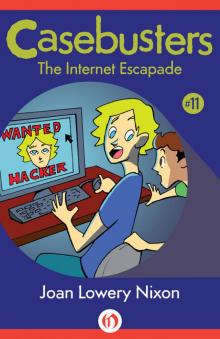 The Internet Escapade
The Internet Escapade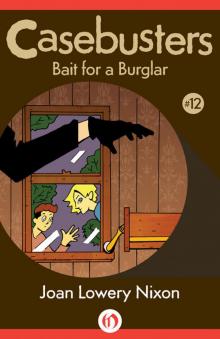 Bait for a Burglar
Bait for a Burglar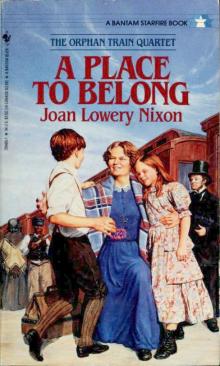 A Place to Belong
A Place to Belong Nightmare
Nightmare Sabotage on the Set
Sabotage on the Set The Other Side of Dark
The Other Side of Dark Whispers from the Dead
Whispers from the Dead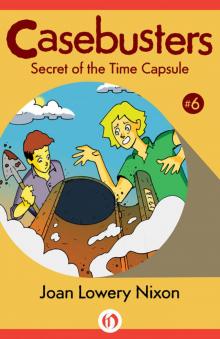 Secret of the Time Capsule
Secret of the Time Capsule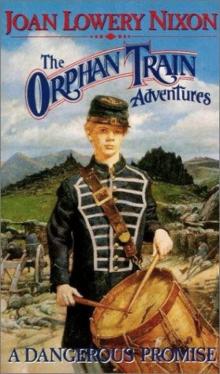 A Dangerous Promise
A Dangerous Promise Laugh Till You Cry
Laugh Till You Cry Spirit Seeker
Spirit Seeker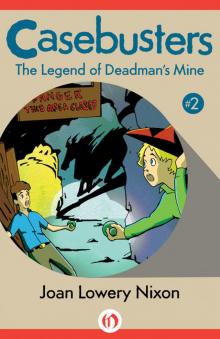 The Legend of Deadman's Mine
The Legend of Deadman's Mine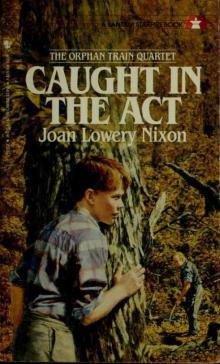 Caught in the Act
Caught in the Act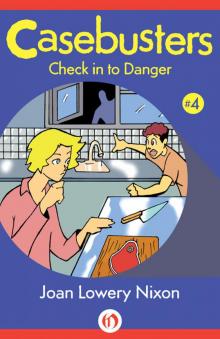 Check in to Danger
Check in to Danger Ellis Island: Three Novels
Ellis Island: Three Novels The Name of the Game Was Murder
The Name of the Game Was Murder The Haunting
The Haunting Lucy’s Wish
Lucy’s Wish Playing for Keeps
Playing for Keeps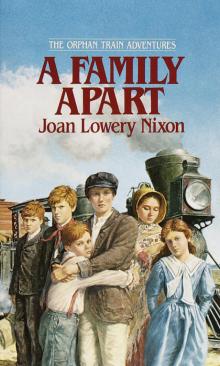 A Family Apart
A Family Apart Nobody's There
Nobody's There Shadowmaker
Shadowmaker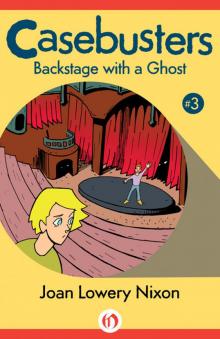 Backstage with a Ghost
Backstage with a Ghost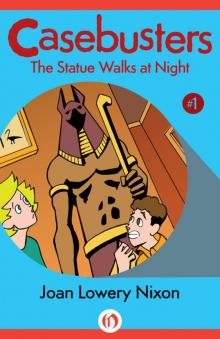 The Statue Walks at Night
The Statue Walks at Night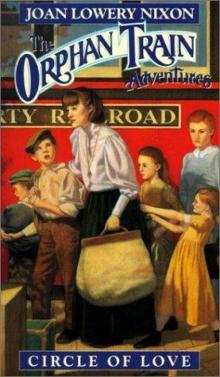 Circle of Love
Circle of Love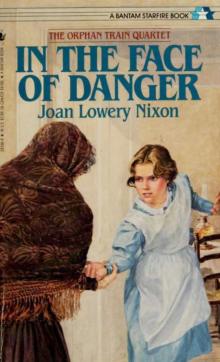 In the Face of Danger
In the Face of Danger Ghost Town
Ghost Town A Candidate for Murder
A Candidate for Murder The Weekend Was Murder
The Weekend Was Murder The Island of Dangerous Dreams
The Island of Dangerous Dreams The Ghosts of Now
The Ghosts of Now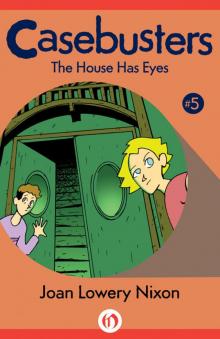 The House Has Eyes
The House Has Eyes The Dark and Deadly Pool
The Dark and Deadly Pool Keeping Secrets
Keeping Secrets Secret, Silent Screams
Secret, Silent Screams Beware the Pirate Ghost
Beware the Pirate Ghost Search for the Shadowman
Search for the Shadowman Haunted Island
Haunted Island